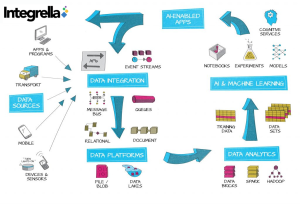In today’s rapidly evolving technological landscape, the integration of artificial intelligence (AI) into business operations has become increasingly vital for staying competitive. As AI continues to permeate various industries, integration companies play a crucial role in supporting clients who are eager to harness its potential. However, embarking on the AI journey can be daunting for many organisations, requiring careful planning, expertise, and ongoing support. In this blog post, we’ll explore how integration companies can effectively guide their clients through the process of integrating AI into their workflows while ensuring seamless implementation and continued success.

Understanding Client Needs and Objectives
Before diving into AI integration, it’s essential for integration companies to gain a comprehensive understanding of their clients’ specific needs, challenges, and objectives. This involves conducting thorough consultations and assessments to identify areas where AI solutions can deliver the most significant impact. By aligning AI initiatives with business goals, integration companies can tailor their approach to meet the unique requirements of each client, ensuring that investments in AI technology yield tangible results.
Education and Awareness
Many organisations may be intrigued by the potential of AI but lack the necessary knowledge and expertise to leverage it effectively. Integration companies can bridge this gap by providing education and awareness initiatives to demystify AI concepts, applications, and benefits. This may involve organising workshops, webinars, or seminars to familiarise clients with AI technologies, best practices, and real-world use cases. By empowering clients with the requisite knowledge, integration companies can facilitate informed decision-making and foster a culture of innovation within client organisations.
Collaborative Planning and Strategy Development
Successful AI integration requires a collaborative approach between integration companies and their clients. Together, they can develop a comprehensive strategy that outlines clear objectives, timelines, resource requirements, and success metrics. This strategic planning phase should involve identifying the most suitable AI technologies, data sources, integration points, and deployment methods based on the client’s unique context and goals. By co-creating a roadmap for AI implementation, integration companies can ensure that all stakeholders are aligned and committed to the journey ahead.
Customised Solutions and Implementation
One size does not fit all when it comes to AI integration. Integration companies must develop customised solutions that address the specific needs and challenges of each client. This may involve developing bespoke AI algorithms, models, or applications tailored to the client’s industry, workflow, and data landscape. Additionally, integration companies should oversee the seamless integration of AI solutions with existing systems and processes, minimising disruption and maximising efficiency. By providing end-to-end support throughout the implementation phase, integration companies can instil confidence in their clients and facilitate a smooth transition to AI-powered operations.
Continuous Monitoring and Optimisation
The journey doesn’t end once AI solutions are deployed. Integration companies must offer ongoing monitoring, maintenance, and optimisation services to ensure that AI systems perform optimally over time. This includes monitoring key performance indicators, detecting anomalies, and refining AI models based on evolving business requirements and feedback. By continuously fine-tuning AI algorithms and workflows, integration companies can help their clients stay ahead of the curve and extract maximum value from their AI investments.
Empowering Clients for Long-Term Success
Ultimately, the goal of integration companies is to empower their clients to become self-sufficient in leveraging AI for sustained growth and innovation. This involves not only providing technical support but also fostering a culture of learning, experimentation, and adaptation within client organisations. Integration companies can offer training programmes, documentation, and resources to enable clients to develop in-house AI expertise and explore new opportunities for leveraging AI across various domains. By empowering clients for long-term success, integration companies can forge enduring partnerships built on trust, collaboration, and mutual success.
In conclusion, integration companies have a pivotal role to play in supporting clients who are eager to harness the power of AI. By understanding client needs, providing education and awareness, collaboratively planning and strategising, delivering customised solutions, and offering ongoing support and empowerment, integration companies can guide their clients through the AI integration journey with confidence and clarity. Together, they can unlock new possibilities, drive innovation, and achieve sustainable growth in an increasingly AI-driven world.

